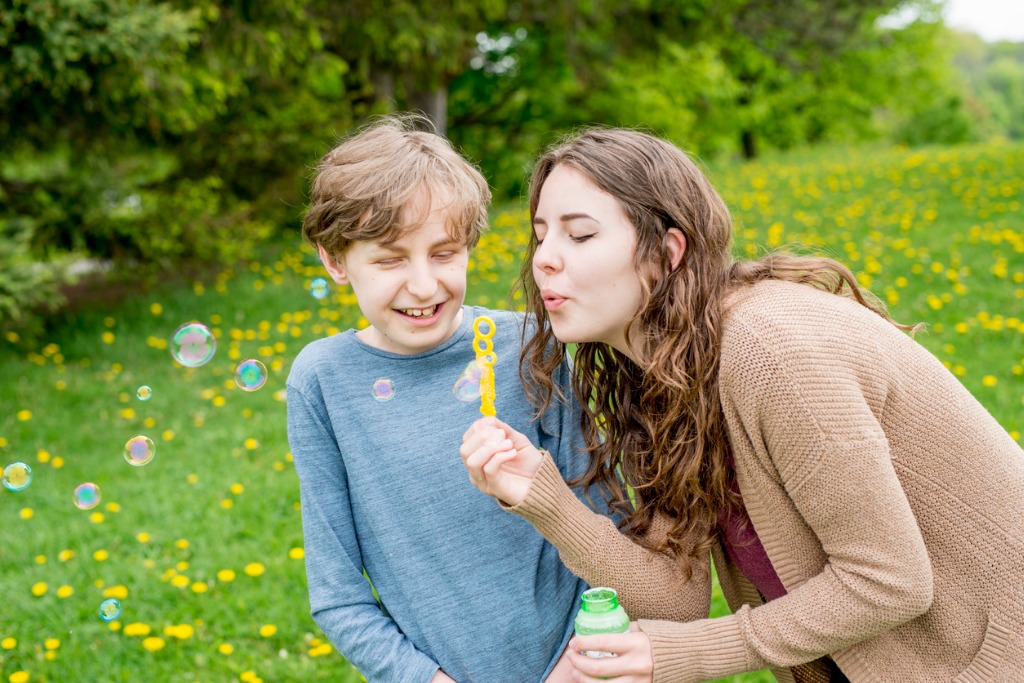
Positive feelings and experience for young siblings
Having fun with their brother or sister
‘I love to hug and tickle my brother, it makes me laugh.’
Feeling caring, protective, and proud
‘I constantly feel proud of my brother. He never lets his disability get in his way; he is an inspiration to me.’
Developing tolerance for others
‘Her deafness has shown me how to accept other people’s disabilities.’
Being in touch with other siblings
‘It’s always nice to know you’re not alone, and if you know there is someone to talk to on here (especially if you speak to them often) then it relieves you of some of the things you struggle with.’
Having opportunities for learning new skills
‘My knowledge of first aid is very good for my age. This is due to the fact that I must know what steps to take if my sister does collapse or has any allergy reactions or seizures.’
Difficult feelings and experiences for young siblings
Not understanding the disability or condition
‘My brother keeps doing the same stuff all the time. He has to wear the same clothes every day, I don’t know why.’
Feeling embarrassed
‘Sometimes I get quite embarrassed when my friends come to our house and Andrew poos his nappy. They don’t know why he has to wear nappies and they think at his age he should go to the toilet.’
Worrying about their brother’s or sister’s health
‘I just worry. I am thinking, he might be so poorly, he might die.’
Feeling angry, sad, resentful or guilty
‘Sometimes I feel sad when my brother is away, like when he was taken to hospital’
Feeling that their parents don’t give them enough attention
‘Mum and dad are so unfair. My disabled brother gets way more attention than me’
Concern about what will happen in the future
‘In the future, I wonder about what’s going to happen to her. Is she going to get a job? I know that I can. I don’t know if she would be able to. I don’t know if she’ll ever get one. Or if she’ll ever get married and have kids.’
Not being able to do things together as a family
‘It’s hard to ever get anything done as we have to plan everything around her. It’s hard to go on holiday and stuff like that.’
Siblings at different life stages
These are some of the things that may be happening for siblings at different ages as they grow up with a brother or sister who is disabled or has additional needs. By being aware that these may happen you can take action to help your sibling child cope with these.
- Less time and attention from parents
- Feeling jealous of their brother or sister who is disabled or has additional needs
- Clingy or unsettled during or after a parent stay in hospital
- Imitating an older child’s behaviour
- Wanting to try out their brother or sister’s equipment and therapies
- Other children asking questions about their brother or sister’s disability or condition
- Talking to friends and others about their brother or sister
- Dealing with teasing and embarrassment
- Being involved in caring for their brother or sister
- Needing information about their brother’s or sister’s disability or condition
- Not having enough time together as a family.
- Wanting their brother or sister to have his or her own friends
- Not being able to have friends home for sleepovers
- Concern about introducing new friends to their brother or sister
- Feeling embarrassed about going out as a family
- Feeling ashamed of feelings of embarrassment or resentment
- Supporting parents with their emotions
- Worrying about their brother or sister making transitions, for example, to secondary school
- Making decisions about their future based on whether they feel they need to help and support at home
- Concern what will happen if their parents are no longer able to look after their brother or sister
- Being involved in planning their brother or sister’s future
- Supporting their parents with the care of their brother or sister
- Uncertainty about when to introduce partners to their brother or sister
- Wondering about genetic issues and having children of their own
